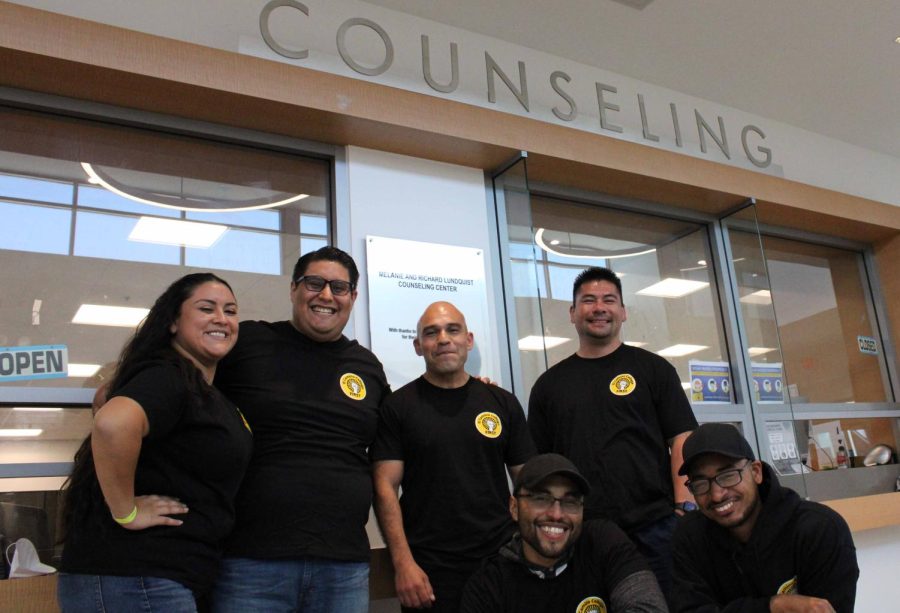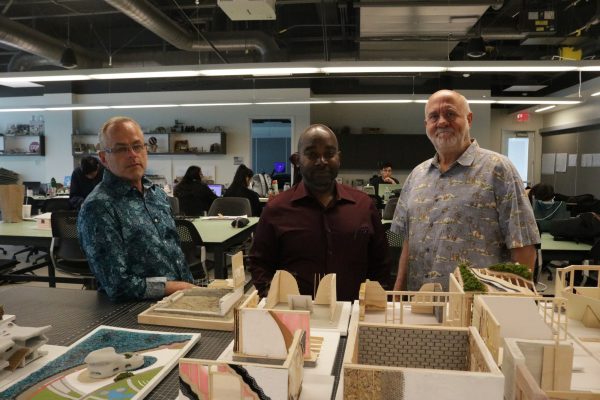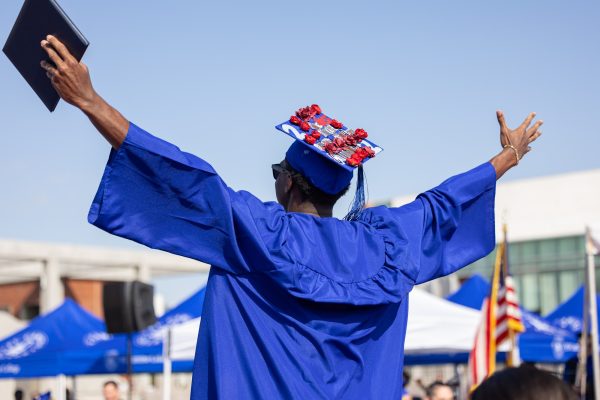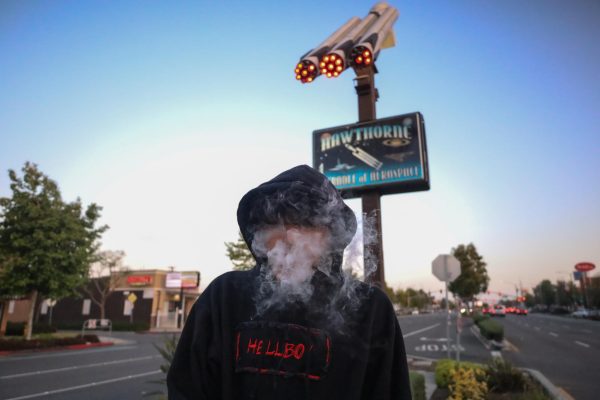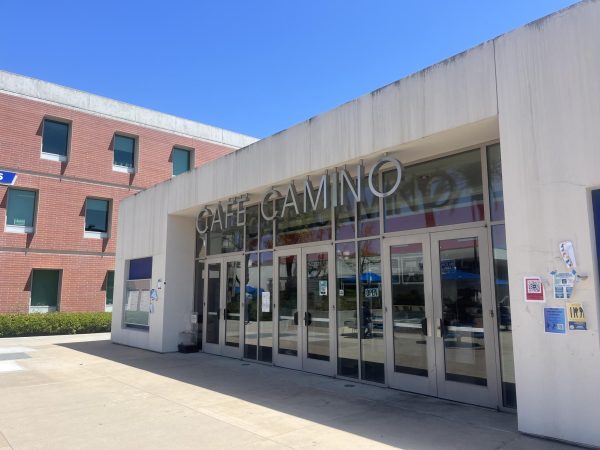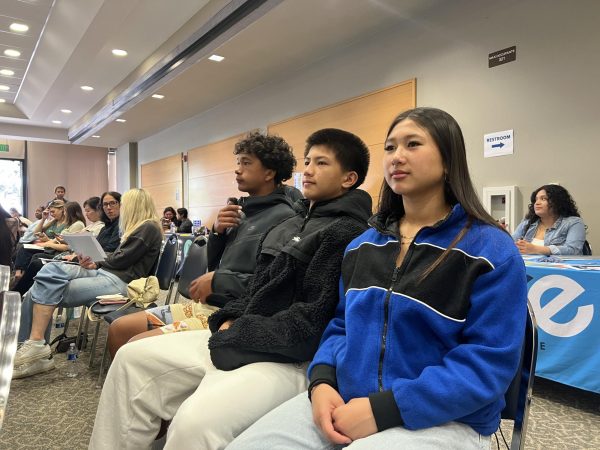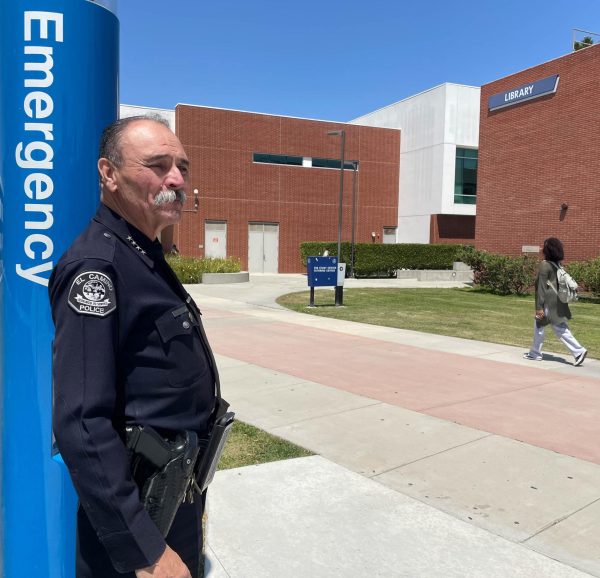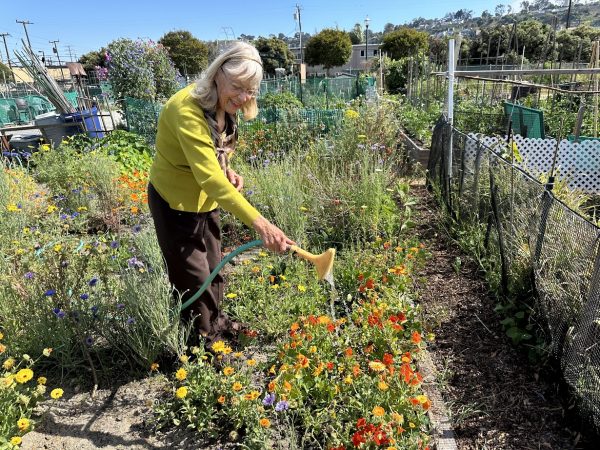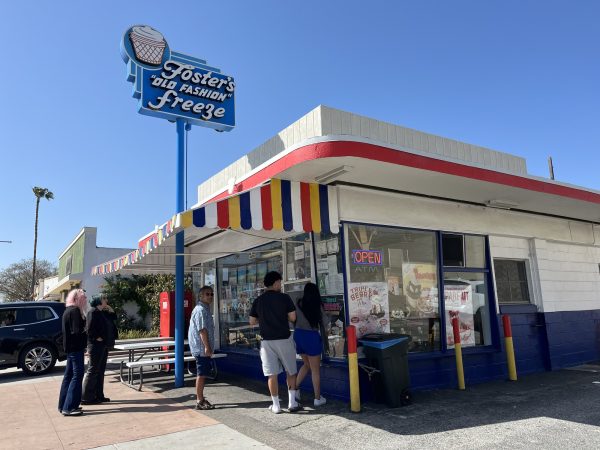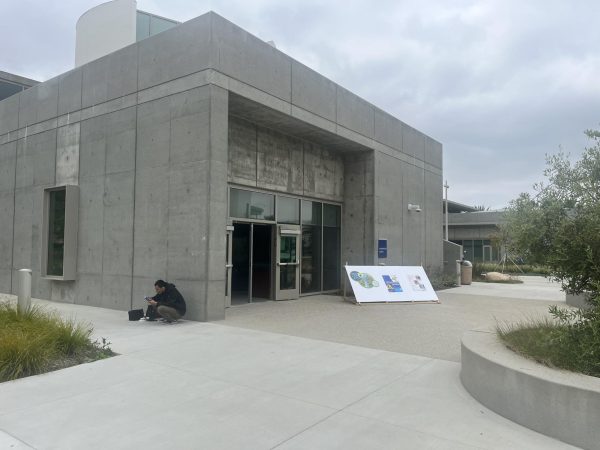El Camino’s FIRST Program supports formerly incarcerated students to succeed in college
Staff and members of the El Camino College Formerly Incarcerated Re-Entry Students Thriving (FIRST) Program outside their office located in the Counseling Center on the second floor of El Camino’s Student Services building on Thursday, April 14. Since its start in 2019, FIRST has supported 56 formerly incarcereted or system impacted students to register for classes; access financials aid; connect to resources for housing, income assistance, food and clothing; prepare to tranfer to a university and/or career; and to navigate the often confusing, discrimnatory and challenging re-entry process. Pictured here are (L to R) Isabel Gonzalez, FIRST success coach, Ricky Gonzalez, FIRST program coordinator, Luis Medina, Pablo Giron, Eduardo Dumbrique and Gerardo Diaz. (Kim McGill | The Union)
Eduardo Dumbrique grew up in Lawndale and was 15 when he was arrested, transferred into adult court, and given a life sentence.
Throughout his incarceration, Dumbrique did not have access to formal education, including his 13 years served in solitary confinement where human contact – let alone college and other programming – was prohibited by the California State Department of Corrections and Rehabilitation.
According to a lawsuit that described the conditions that Dumbrique and others endured, “Prisoners spend 22 ½ to 24 hours every day in a cramped, concrete, windowless cell. They are denied telephone calls, contact visits and vocational, recreational or educational programming.”
Dumbrique was released from state prison thirteen months ago after serving 24 years.
“I got out and enrolled immediately in school,” Dumbrique said. “But, my first semester at [El Camino College], I didn’t really know what I was supposed to do.”
Without any guidance, Dumbrique struggled. The last time he was in school, he was in sixth grade.
“I never got to experience choosing courses or having different teachers for each class. You can fall behind if you don’t stay on it. I didn’t even have books for the first five weeks at ECC,” Dumbrique said.
In addition to adjusting to the college flow, Dumbrique was also using a computer for the first time.
“Understanding computers was challenging, not knowing how to use them at all, literally all the buttons. I didn’t know basic things – it’s kind of embarrassing – like how to attach an image to an email. To this day, I still struggle getting into Canvas,” Dumbrique said.
Due to these setbacks and challenges, Dumbrique didn’t do well during his first semester at El Camino College.
At the start of his second semester, Dumbrique found El Camino’s Formerly Incarcerated Re-Entry Students Thriving (FIRST) Program. FIRST success counselors helped him to schedule his classes, develop a plan to graduate and transfer and connect to services and tutoring.
“They’ve been so helpful,” Dumbrique said. “Now, I’m doing well. I’m very grateful.”
FIRST is located within the Counseling Center on the second floor of El Camino College’s Student Services building.
“We have gotten a lot of support from El Camino College including space, the ability to apply for funding for the program, and access to campus resources,” FIRST Program Coordinator Ricky Gonzalez said.
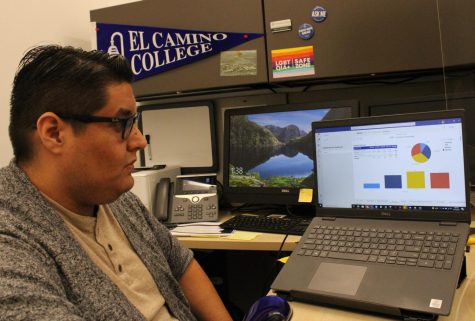
Last semester, FIRST organized a week of action that included ally workshops for El Camino staff, faculty and programs to build greater understanding and support on campus for system-impacted students.
Gonzalez cited the Warrior Pantry food program and Warrior Closet for clothing as examples of where FIRST members go for additional services.
The vast majority of the program staff or their immediate family members have been convicted or incarcerated. Gonzalez said this is key to the program’s success.
“The system shaped us and our families,” Gonzalez said. “We want people to know that they are already a success just by stepping onto a college campus.”
FIRST student Gerardo Diaz liked elementary and middle school but was quickly trapped in the school-to-jail track where harsh school discipline pushed many students into the streets.
“I attempted ditching, following my older brother, but I wasn’t able to jump over the fence,” Diaz said laughing.
He was attending English as a second language (ESL) classes and felt that school was important.
“How am I going to function in the world without [school]? They are teaching me something that I need,” Diaz said. “But, when you are a teenager, sometimes your friends become more valuable. You need social acceptance. I wasn’t feeling that at home. Friends or school? You try and balance both out, but the basic needs – the sense of belonging, the sense of safety – some schools don’t have that.”
Eventually, Diaz started falling behind. He flunked fifth grade and was expelled from Virgil Middle School in South Central Los Angeles by sixth grade. He was expelled from two additional middle schools, and by the age of 14, in 2001, Diaz was in juvenile hall for the first time.
“I went to three probation camps and ran away from six placements. They finally kicked me out of the system because I was 18,” Diaz said.
Not long after, Diaz was convicted on new charges, this time as an adult. He served 15 years in state prison. He was incarcerated on level four, the highest, most restrictive yard in prison, with little to no programming.
“I thought, ‘I’m gonna die right here,’” Diaz said.
Then, a prison computer class teacher pointed Diaz out as a good student.
“He told the people in class, ‘Try and be more like Diaz.’ That’s when I decided to continue on a path toward education,” Diaz said.
The beginning readjustment to education was challenging for Diaz.
“Now I’m out [of prison],” Diaz said, “And entering this new generation, new technology, new responsibility. It’s like a whole new dimension. I feel like one of those kids they held back in a [science] lab for this whole time that they finally let out. I don’t know simple terms. People are speaking and I’m like ‘What’s that?’ It’s like I’m five years old.”
Diaz credits FIRST with his increasing belief that he can succeed in college.
“A lot of us were raised in a home where our parents or people around always told us, ‘You’re stupid, you’re not going to make it.’ Some of those insecurities, of course, stay with you,” Diaz said.
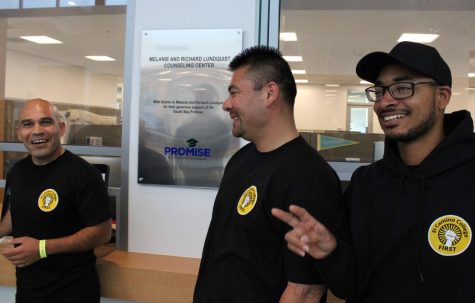
Since its start in 2019, the FIRST program has worked with a total of 56 students. Three have graduated with their associate degree and two have transferred to a California State University. This semester, there are 30 students in the program.
“I’ve been in prison for a long time and that whole feeling alone, and having to do things by yourself, it takes a toll on you,” Diaz said. “We come to college with some sort of confidence, but we feel overwhelmed – like ‘maybe I’m not cut out for this.’”
Programs like FIRST are especially important given dramatic changes in California’s sentencing laws over the past 40 years.
During a brief period following the social justice movements of the 60s and 70s, prisons across the country implemented widespread educational and vocational programs, including college, that were considered essential to rehabilitation and the prevention of recidivism.
However, by the time Dumbrique and Diaz entered the system, this short period of reform had been replaced by decades of harsh, tough-on-crime policies. California enacted hundreds of laws and several ballot initiatives that dramatically increased sentences and also removed rehabilitative and educational programs from most prisons.
Therefore, many people coming home from federal and state prisons have had little or no formal education, but are eager to go to school.
“It took me 14 years to get my GED and that’s only because the program wasn’t available,” Dumbrique said.
With harsher sentencing laws, the prison population also exploded from less than 30,000 in 1980 to a high of 173,643 people in 2006. In less than 30 years, California built 22 new prisons, but only one University of California and three Cal State campuses, and now has a total of 34 prisons and 32 public universities. The state budget went from first nationwide in spending for higher education and K-12 public schools to first in prison spending and near the bottom in funding for education
Then, over the last two decades, movements led by people most severely impacted by incarceration began to win legislative changes to reduce sentences, as well as the passage by voters of Proposition 47 dropping many drug-related convictions from felonies to misdemeanors and Proposition 57 enabling incarcerated people to come home earlier if they complete programs, especially education. This also increased pressure for prison-based education.
As a result of recent reforms, the state’s prison population has dropped to less than 100,000, and tens of thousands of people have come home.
Luis Medina is attending his first semester at El Camino after serving 23 years in state prison. This semester is his first time attending college outside of prison and he needs only one class to finish his associate degree.
With FIRST’s help, Medina registered for the class he needs to finish.
“When you are in prison you write down your ‘network,’ the people you are going to reach out to when you encounter problems or triggers on the outside,” Medina said. “The people at FIRST have become part of my network.”
FIRST is part of a growing effort across California to support formerly incarcerated and convicted students to enroll and succeed in college.
In addition to FIRST at El Camino, similar projects exist at several community colleges united through the Rising Scholars Network. To support student transfers to pursue a bachelor’s and/or graduate degree, FIRST connects its members to Project Rebound programs that operate at several Cal State universities and Underground Scholars programs that are located on some University of California campuses.
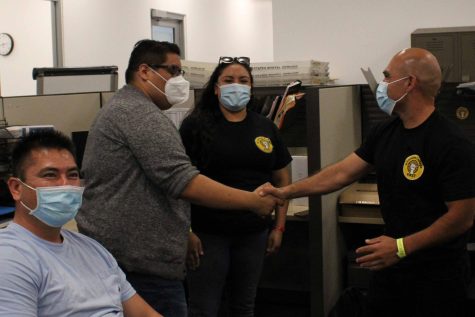
Diaz urged colleges to understand the financial pressures formerly incarcerated students face. They are usually much older, have lost years of income, and often have lost connection to family that could support them with housing and other expenses.
“Grants are big because a lot of us don’t really have money to survive so we can go to school,” Diaz said. “How can I worry about my tests if I haven’t ate for two days straight?”
Dumbrique said that even though he’s much older than many of the students who he is in school with, he feels young because he missed all the experiences they have had on the outside.
“Maybe it would be nice if we had a prom or some kind of equivalent, like a school dance,” Dumbrique said. “And that’s because I didn’t ever get prom, or school dances or field trips.”
The California state legislature recently allocated $10 million over three years to 50 community colleges, covering 31% of the state’s 160 campuses, for programs to support system-impacted and formerly incarcerated students.
El Camino’s FIRST program received one of the grants along with programs at Long Beach City College, Compton Community College and East Los Angeles College.
FIRST members said the benefits of education for themselves, their families and communities are clear.
Medina was connected to FIRST by a college counselor at Cal State Fullerton who he used to be locked up with, and now he also hopes to become a counselor that helps other people transition from prison to college.
“Colleges should know that there is a lot of potential in prison. The nightmare (of prison) deepens because you know that you have this mind that’s working and yet you’re trapped. There are a lot of hungry minds coming out, eager to learn,” Medina said.
Dumbrique is currently studying juvenile law and public speaking at El Camino. He also goes back into Los Angeles County juvenile halls to speak with young people. Inside the prison, he worked for over 18 years to study law on his own and helped people file the courts for improved conditions of confinement and re-sentencing.
He hopes to become an attorney to fight for youth and parents’ rights when a child is going through the court system.
“I saw what my family went through having me taken from them, and I also know what it’s like for the youth since I have been there,” Dumbrique said. “In America, juvenile rights are not settled. There is no uniform process or sentencing laws across all the states. That’s an area where we can make a difference for the future.”
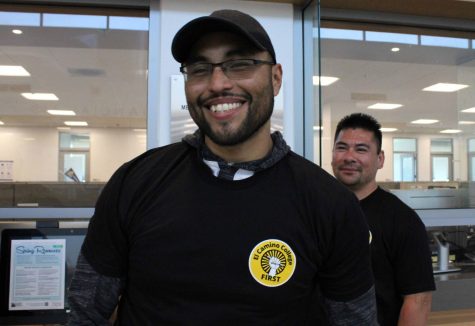
Diaz is studying to be a psychologist and wants to transfer to the University of Southern California for a master’s or doctorate. Advancements in behavioral science contributed greatly to challenging the harsh sentencing of youth whose cognitive skills are not fully developed until the age of 25, including contributing to the passing of Senate Bill (SB) 9, SB 260, SB 261, and Assembly Bill 1308, enabling Diaz and numerous others to earn an earlier release from prison.
“I’m intrigued when it comes to the mind, about why people do certain things,” Diaz said.
Diaz also said he saw the impacts in the prison system when people didn’t get access to mental health care.
“There’s more violence, of course. Depression. When things happened on the outside with their parents, their family or kids, they couldn’t really vent, because in there, it’s more about repressing your feelings,” Diaz said. “You don’t express your emotions to anybody because the next person may use it against you. They may think you’re weak, so they may try and harm you.”
Diaz said he recognizes the lack of mental health and educational support as a significant factor in why he got involved in crime and violence in the first place and said receiving support plays a huge role in changing a person’s perspective.
“It’s been the spirit, the energy of FIRST that’s important – ‘Keep going, you could do this.’ That helps me stay more confident within myself because I know in hard times, I’ll have someone to fall back on.” Diaz said.
Editor’s Note: Updated to remove phrase from lead and caption on May 12, 2;14 p.m.


